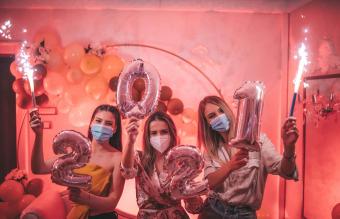
Getting the diagnosis of cancer and starting chemotherapy can be a stressful period in your life. Along with the concerns for your health and life, you may also be worried about the effects of chemotherapy - on yourself and on other members of your family. There are chemotherapy safety precautions that you can take to protect yourself and others.
Preventing Exposure
Although the drugs can be found in your urine, stool, vomit, and tears, you should still be able to spend time with your friends and family during your chemotherapy treatments. Because it takes 48 hours for chemotherapy medications to be metabolized and broken down in the body, you should take certain steps during that time to lower any risks from exposure.
Steps for You
The goal here is to avoid exposing others to any of the drugs as they leave your body. Taking the following steps can help:
- When using the toilet, you should flush twice after using and put the toilet lid down during this time. If possible, you should use a separate toilet.
- Both men and women should sit down on the toilet to lower the risk of splashing.
- Always wash your hands with soap and water after using the toilet while using paper towels to dry your hands.
- If you vomit into the toilet, you should flush twice and wipe the toilet off to make sure that there are not any splashes.
- If you vomit into a bucket or basin, you should empty it into the toilet and flush twice. The bucket will need to be cleaned out with hot soapy water and dried with paper towels. The towels need to be thrown away afterwards.
- Clothes or sheets that have bodily fluids on them should be washed by machine and not by hand. These items should be washed twice and should be separated from other clothing. If the clothes cannot be washed right away, you can place them in a pillowcase separate from other laundry.
- Sanitary napkins or adult diapers need to be placed in a plastic bag and put in the trash.
Steps for Caregivers
Sometimes, you may feel badly after chemotherapy and need a caregiver to help. Caregivers need to be careful when assisting someone who is taking chemotherapy as well.
- Caregivers should wear disposable gloves when handling anything associated with the chemotherapy patient to avoid any skin or other contact. Two pairs of latex or nitrile gloves are best.
- If there is any skin contact, the caregiver should wash the exposed skin with warm soapy water. A solitary exposure typically does not cause any problems, but frequent exposures might.
Some patients may receive chemotherapy at home; for protection from the medications themselves, you can purchase chemotherapy cleaning kits that contain all of the items you would need to clean up chemotherapy medications. Your physician, oncology nurse, or home health agency can make sure that you get those if needed.
Preventing Infection
Chemotherapy lowers your ability to fight infections. Avoiding infection is one of the major precautions while you are on chemotherapy.
- Wash your hands frequently.
- Avoid anyone who is sick, especially anyone who has a contagious disease like colds, flu, or chicken pox.
Avoid Open Wounds
Try to avoid anything that may cause open wounds on your skin.
- Use an electric shaver instead of a razor.
- Do not bite your cuticles.
- Use a soft-bristled toothbrush to protect your gums.
- Do not get any immunizations without speaking to your physicians. You should also avoid any people who have recently received an immunization - your physician can tell you for how long.
Practice Food Safety
Food safety can be very important as well. You need to make sure that you maintain proper food safety during your treatment. However, there are some foods that you should avoid while taking chemotherapy:
- Unpasteurized, raw milk, cheese, and other dairy products
- Moldy soft cheeses
- Raw or undercooked meats and eggs
- Unwashed fruit and vegetables
- Raw tofu
Your oncology care providers can help you with your diet to help ensure your health during this time.
Preventing Pregnancy
Chemotherapy drugs can be found in vaginal secretions and semen. This means that you should be very careful about sexual relations for up to about 48 hours after the last chemotherapy dose. Some experts recommend using a condom during intercourse during those 48 hours while others recommend that you should avoid sexual activity for that time frame. You should speak to your physician for specific advice.
You also need to avoid pregnancy during your chemotherapy treatment. Using two forms of birth control during your therapy can help with that; you need to also avoid pregnancy for 6 months after your treatment ends.
Where to Get More Information
There are several places to obtain information about chemotherapy safety precautions.
- The American Cancer Society has several articles and pamphlets about life while on chemotherapy that you can read online or download.
- The National Cancer Institute also contains several booklets and fact sheets to give you guidance.
- You can also get information from various cancer support groups; one group may be associated with your cancer center. An example of all of the support services that may be available is M.D. Anderson.
Remember that your oncologist and oncology nurse both have a wealth of information and can take time to answer any questions about your chemotherapy that you might have.







